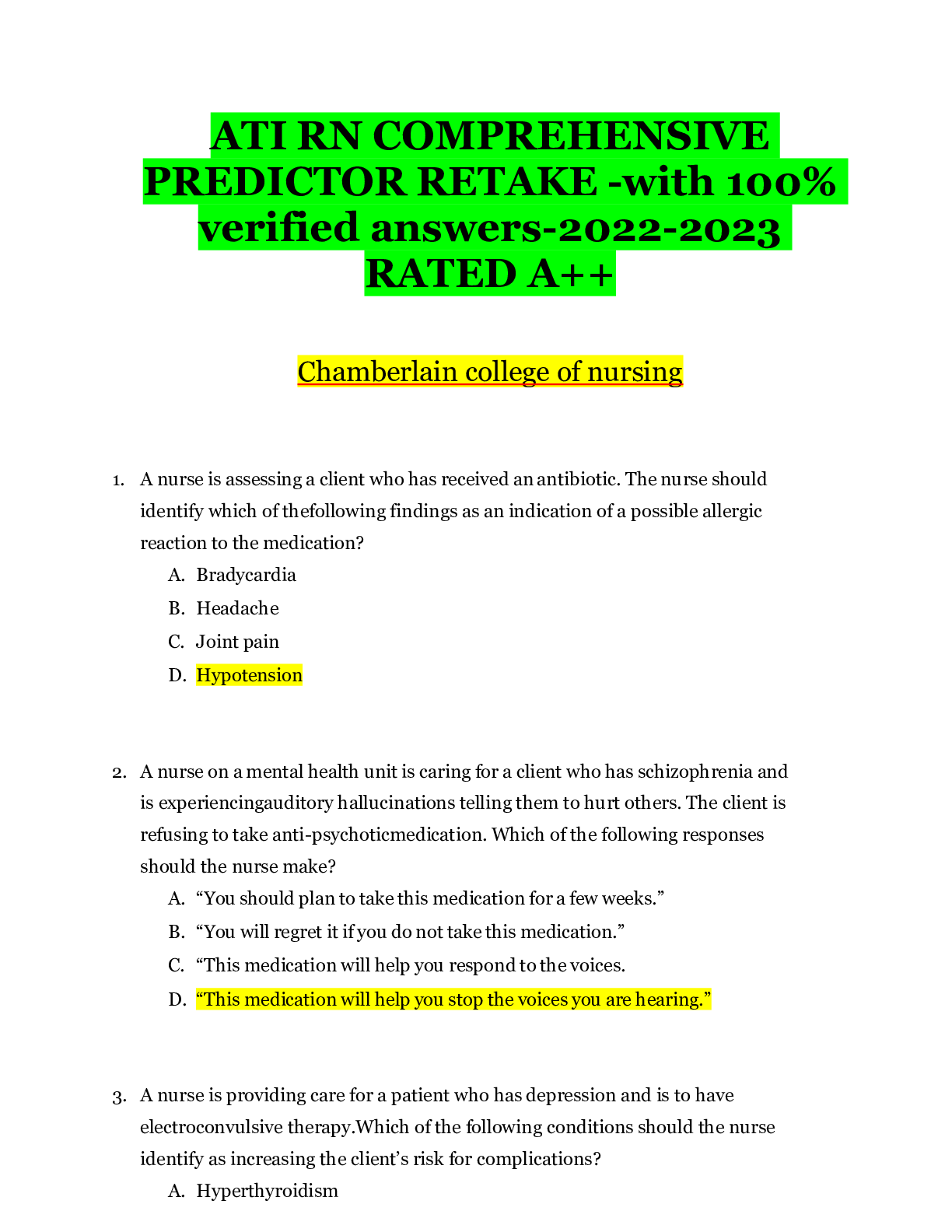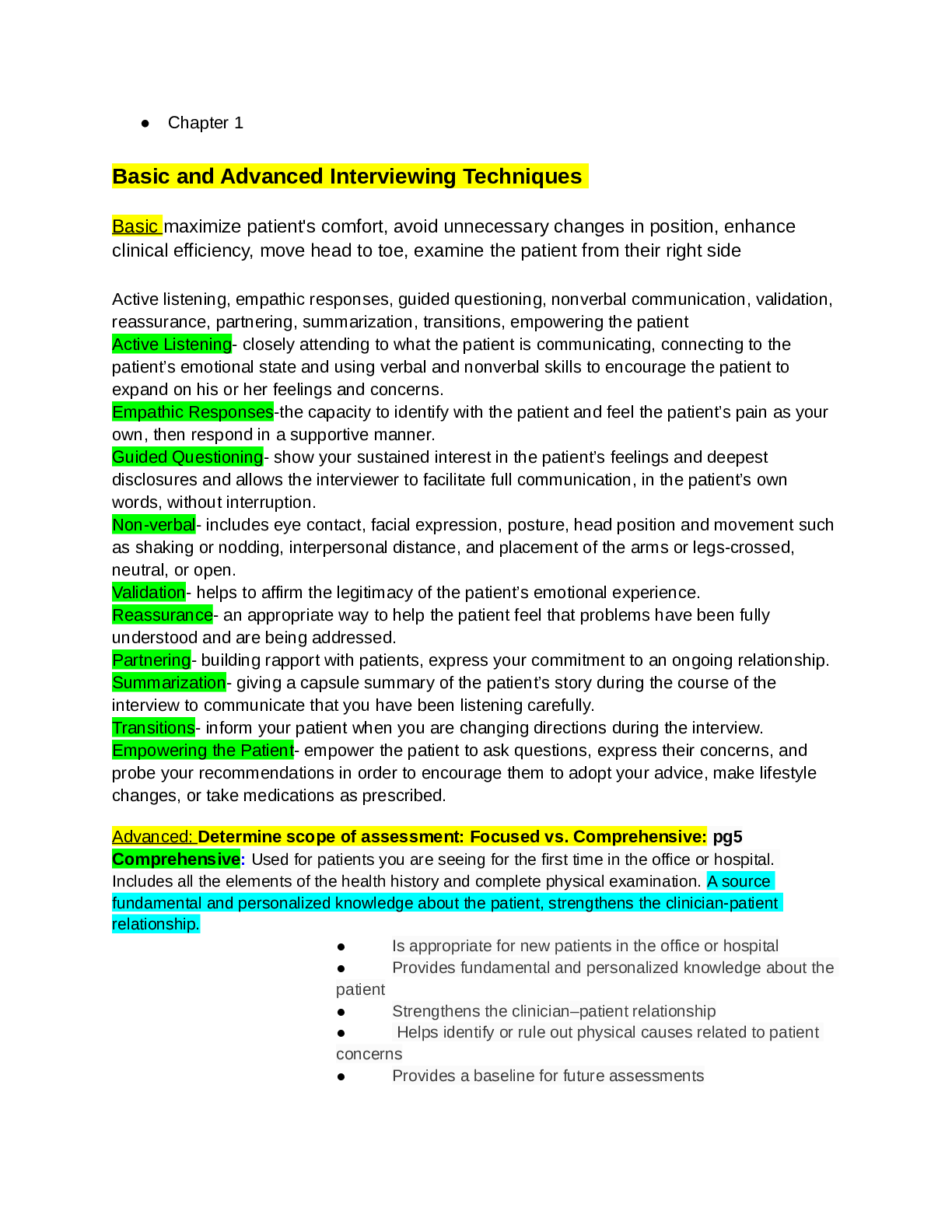 (1).png)
BUS-206 5.2 Milestone Two Case Study Two | Southern New Hampshire University
$ 9

ATI RN COMPREHENSIVE PREDICTOR RETAKE -with 100% verified answers-2022-2023 RATED A++
*NURSING > QUESTIONS & ANSWERS > NR 509 Mid-Term Exam (All)
●Chapter 1 Basic and Advanced Interviewing Techniques Basic maximize patient's comfort, avoid unnecessary changes in position, enhance clinical efficiency, move head to toe, examine the patient from ... their right sideActive listening, empathic responses, guided questioning, nonverbal communication, validation, reassurance, partnering, summarization, transitions, empowering the patientActive Listening- closely attending to what the patient is communicating, connecting to the patient’s emotional state and using verbal and nonverbal skills to encourage the patient to expand on his or her feelings and concerns.Empathic Responses-the capacity to identify with the patient and feel the patient’s pain as your own, then respond in a supportive manner.Guided Questioning- show your sustained interest in the patient’s feelings and deepest disclosures and allows the interviewer to facilitate full communication, in the patient’s own words, without interruption.Non-verbal- includes eye contact, facial expression, posture, head position and movement such as shaking or nodding, interpersonal distance, and placement of the arms or legs-crossed, neutral, or open.Validation- helps to affirm the legitimacy of the patient’s emotional experience.Reassurance- an appropriate way to help the patient feel that problems have been fully understood and are being addressed.Partnering- building rapport with patients, express your commitment to an ongoing relationship.Summarization- giving a capsule summary of the patient’s story during the course of the interview to communicate that you have been listening carefully.Transitions- inform your patient when you are changing directions during the interview.Empowering the Patient- empower the patient to ask questions, express their concerns, and probe your recommendations in order to encourage them to adopt your advice, make lifestyle changes, or take medications as prescribed.Advanced: Determine scope of assessment: Focused vs. Comprehensive: pg5Comprehensive: Used for patients you are seeing for the first time in the office or hospital. Includes all the elements of the health history and complete physical examination. A source fundamental and personalized knowledge about the patient, strengthens the clinician-patient relationship.●Is appropriate for new patients in the office or hospital●Provides fundamental and personalized knowledge about the patient●Strengthens the clinician–patient relationship● Helps identify or rule out physical causes related to patient concerns●Provides a baseline for future assessments [Show More]
Last updated: 3 years ago
Preview 1 out of 69 pages

Buy this document to get the full access instantly
Instant Download Access after purchase
Buy NowInstant download
We Accept:

Can't find what you want? Try our AI powered Search
Connected school, study & course
About the document
Uploaded On
Jul 28, 2021
Number of pages
69
Written in
All
This document has been written for:
Uploaded
Jul 28, 2021
Downloads
0
Views
65
Scholarfriends.com Online Platform by Browsegrades Inc. 651N South Broad St, Middletown DE. United States.
We're available through e-mail, Twitter, and live chat.
FAQ
Questions? Leave a message!
Copyright © Scholarfriends · High quality services·